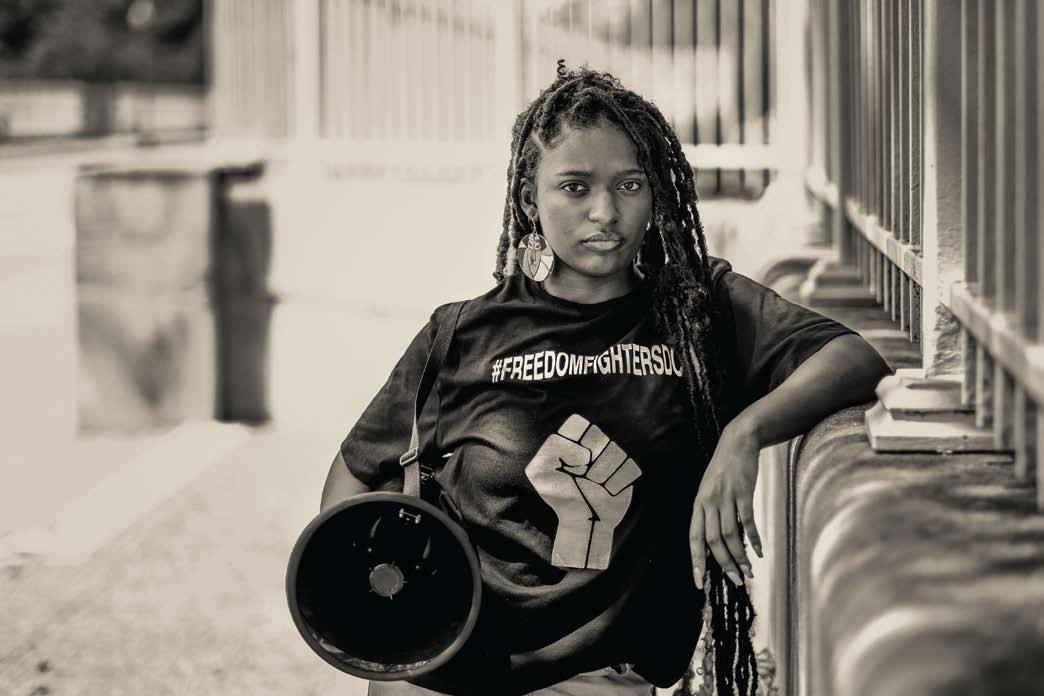
23 minute read
COVER STORY
BEHIND THE Meet six young leaders organizing to fight systemic
MOVEMENT racism and support those in need. By Ella Feldman Photographs by Darrow Montgomery FREEDOM FIGHTERS DC, the force behind many of the marches and demonstrations against anti-Black racism and police brutality that have taken place in D.C. this summer, started with a single tweet. On May 28, three days after Minneapolis police officer Derek Chauvin killed George Floyd, Philomena Wankenge, a 22-year-old living in Stafford County, Virginia, sent out a digital call for D.C. locals interested in protesting. As demonstrations cropped up around the country, Wankenge’s tweet gained traction, eventually leading to a GroupMe chat of about 35 organizers who, for the most part, had never met. They planned their first event for five days later, on June 3: a march from Freedom Plaza to the Capitol, followed by a sit-in, which brought out approximately 700 people, says founding member and director of public affairs Kerrigan Williams. Within a matter of days, FFDC was born. They weren’t alone. In late May and early June, Black-led, grassroots organizations––like FFDC, Concerned Citizens of D.C., and DC Protests––began springing up to support and lead the ongoing protests that took off locally on May 29, along with existing groups such as Black Lives Matter D.C. and BYP100 D.C. As they’ve protested, members of these groups have weathered intense violence from police, who used pepper spray, tear gas, flash-bang grenades, and rubber bullets on peaceful demonstrators earlier this summer amid President Trump’s deployment of federal troops in the city. The protests they’ve led, participated in, and supported with food, medical attention, and masks have transformed the city, both psychologically and physically––it is in part because of these activists’ intense and sustained efforts that Mayor Muriel Bowser decided to christen Black Lives Matter Plaza, and that the White House cordoned off swaths of previously public roads. The young people who lead these newer groups have devoted countless hours of their summer to mobilizing their communities to sit-in at the Capitol, donate food and water to protestors, call their councilmembers, mourn together, and celebrate together. The missions of these groups differ slightly. Some focus on organizing protests, while others raise money to invest in their communities or mobilize people to engage in local politics. Many, if not all, aim to defund the Metropolitan Police Department beyond the modest 5 percent cut the D.C. Council passed in its most recent annual budget vote. But all of these groups have one thing in common: The young people leading these new organizations envision a radically different future, one where community is everything, where neighbors look after each other, and where being who you are doesn’t mean your community looks out for you any less. City Paper spoke with six young people leading grassroots organizations and paving a path toward that future. We could all learn a thing or two from them. −Ella Feldman
Advertisement
JAMIE TURNER, 22 FREEDOM FIGHTERS D.C.
JAMIE TURNER WAS protesting near the White House on May 30 when she was tear-gassed for the first time in her life.
“I couldn’t see. I couldn’t breathe. I honestly felt like I was gonna black out,” Turner recalls. The irony of experiencing brutality from the police at a protest against police brutality is not lost on her. “It’s like, you’re doing exactly what we said you’re doing,” she says. “And you’re just proving us right.”
As she stumbled, unable to see clearly, a stranger asked her if she needed help. Suddenly, someone was pouring milk over her eyes, which helped with the stinging (although experts suggest using cool water first). She says she’s not sure what she and other protesters would’ve done without medical volunteers.
That kind of looking out for one another—people pouring milk in tear-gassed eyes or passing out free snacks and water to fatigued protesters—has been something Turner has noticed over and over again in the past few months as a member of FFDC, an activist group that organizes around Black liberation and efforts to defund MPD. “Being involved with FFDC, it’s made me able to see a world where we’re responsible for each other and we take care of each other,” Turner says.
Although she’s only 22, Turner, who is from Manassas, Virginia, came into FFDC with years of experience in
anti-racist and political activism. A recent graduate of Norfolk State University, where she studied political science, Turner spent her years on campus working with the NAACP, mobilizing voters, and fighting sexual assault. “These protests are huge, but before this, there were people who have been doing [the] work for years,” Turner says. “I know because I’m one of them.”
Turner joined FFDC in early June. Since then, the group has grown to include 40 core members and has been supported by more than 150 volunteers. They’ve organized marches that brought thousands of people to downtown D.C. and sit-ins at the Capitol and Freedom Plaza; the Freedom Plaza sit-in to demand that the D.C. Council defund MPD, which lasted from June 15 to 17, was attended by 80 people. They’ve mobilized people to submit testimonies to the Council against increasing MPD’s budget, which was eventually cut slightly after massive public pressure. They’ve collected donations on Cash App and Venmo, which have been used to support more than 24 activist organizations and fund Uber and Lyft rides for protesters who’d spent a night in jail. (FFDC has not been keeping track of how many donations it has received, according to Kerrigan Williams, one of the group’s founders.)
FFDC’s social media followers have skyrocketed by tens of thousands since the group’s inception; its Instagram now sits at almost 29,000 followers. FFDC uses Instagram and Twitter to promote their own calls to action, promote the work of other grassroots organizations, inform followers of any local news relevant to their mission, and provide live
JAMIE TURNER
coverage of their demonstrations. Turner helps run these accounts, and a lot of her job has been to live-tweet events, which is especially important when the press isn’t there, she notes. “When police were brutalizing protesters, we made sure it was known,” Turner says. “We made sure it was documented.”
The work of FFDC hasn’t gone without pushback. On June 21, Turner helped FFDC organize a vigil on the Duke Ellington Memorial Bridge in Woodley Park to honor Oluwatoyin Salau, a Black Lives Matter activist from Tallahassee, Florida, who was kidnapped and murdered in June, and other Black women who have been killed. They left a memorial with flowers and framed photographs of victims they were honoring. But when the team came back a few days later, they found several smashed photo frames. They cleaned up the mess, but the memorial was tampered with several nights in a row.
“We went back there every single day one week trying to clean it up,” Turner recalls. “We were honestly really devastated every time it happened. The vigil was to honor the lives of those Black women and girls who were lost, so that’s kind of like you dishonoring the lives of those people.”
Eventually, the vandals stopped coming. Now, Turner says she sees many pedestrians stopping to appreciate the memorial. “At the end of the day, the community is all we have,” she says. “It’s so important to build community with each other, because that’s what’s gonna get us through this.”
TY HOBSON-POWELL, 25 CONCERNED CITIZENS OF D.C.
TY HOBSON-POWELL was just 13 years old when he graduated from high school. Two years later, he had a bachelor’s degree from the University of Baltimore. At 17, HobsonPowell obtained his master’s degree in human services from Liberty University, capping off an academic journey that has earned him, over and over again, the label of child prodigy.
But drive and intelligence weren’t the only things that led Hobson-Powell down such an impressive path. At 13, he already understood that, as a Black boy in America, the odds were stacked against him.
“To stand out as a Black man in America, which is already against me every step of the way, I had to do something,” Hobson-Powell says. “I felt like making myself an anomaly with an untraditional academic path would be some of what could set me apart, and of what could give me a fighting chance in a society that doesn’t really care about me.”
Twelve years after his high school graduation, HobsonPowell is living in Colonial Village, where he’s lived for most of his life, and that same lived understanding of systemic racism and inequality drives much of what he does. On June 3, it drove him to create Concerned Citizens of D.C., a group that organizes protests and promotes progressive policies geared toward fighting institutional racism, like a mandatory national hourly minimum wage of $15 and the elimination of law enforcement from primary and secondary schools.
Hobson-Powell, who works full-time at the D.C. statehood campaign 51 for 51, decided he wanted to lead an activism group when he began protesting back in May, in part because he found a lot of emotion coming from the crowds, but not a lot of specific asks. “If you could’ve brought a magic genie down and granted everyone’s wish, there would’ve been a lot of people out there that didn’t quite know what they were wishing for,” he says.
He put out a solicitation on his Instagram for people looking to organize around tangible demands, and brought in five other young activists as co-founders of Concerned Citizens. The group has grown quite a bit since then. They’ve brought thousands of people out to their marches, which typically start at the Chase Bank at 14th Street and New York Avenue NW before moving around the city, according to Hobson-Powell. Their events vary in focus—at a July 23 gathering called Dear Muriel, Concerned Citizens led a forum about local policy outside Mayor Bowser’s private residence; during an event called siren pollution, which they led on July 25 and 26, marchers blared sirens off their phones as they walked through the predominantly White neighborhoods of Georgetown and Glover Park to show residents what over-policing in predominantly Black neighborhoods sounds like. On July 26, they shut down traffic on Key Bridge.
The group is also focused on pressuring legislators to adopt progressive policies, which they’ve documented comprehensively in their Bill of Rights for a New America, published as a petition on Change.org. It outlines policy demands ranging from the elimination of cash bail systems to the implementation of Medicare for All. Concerned Citizens has sent it to every member of the D.C. Council and Mayor Bowser, according to Hobson-Powell, but he hopes lawmakers and citizens from across the country will take a look at it. “We believe that in 2020, we can do so much better than something that was written on a piece of linen paper by a bunch of racist people with a feather,” Hobson-Powell says, referring to the U.S. Constitution.
Between working a full-time job and leading marches and events around the city for Concerned Citizens immediately after work most days, Hobson-Powell hasn’t had a moment to catch his breath in a while. When he finally does, he says he wants to think about how the group can expand its scope to other parts of the country, and maybe other parts of the world. He also plans to reconsider how he can be an effective leader for the causes he cares about, whether that means continuing grassroots work or running for elected office.
“I lend myself to whatever future that the people require of me,” Hobson-Powell says. “If that looks like elected office, then I’ll do elected office. If it looks like me continuing to do what I’m doing now, I’ll continue to do this. It’s just all about what the people want.”
TY HOBSON-POWELL

EBONI ELLIS, 23 FRONTLINE WOMEN DC
EBONI ELLIS HAS spent a lot of time over the past few months out on the streets, either protesting herself or handing out snacks and supplies to marchers. But the moment when she’s felt the most fulfilled this summer took place inside a grocery store—specifically, a Giant in Congress Heights.
Ellis was there with Frontline Women DC, an organization she co-founded on June 3 that mobilizes Black women in D.C. to provide fellow District residents and protesters with food, water, and financial support. As part of the group’s community support efforts, Ellis was walking up to strangers around the store and giving them Giant gift cards.
“It was probably one of the best feelings I’ve had in a long time,” Ellis, a 23-year-old from Michigan Park, says. “Being face-to-face with those we were helping and just making sure that they had the things they need was very fulfilling.”
Grocery giveaways have been a central part of Frontline Women’s work since it began in June. The giveaways prioritize families who reside in Wards 4, 7, and 8, areas Frontline chose in order to combat food deserts and support low-income households, Ellis says. They take place virtually—residents can fill out an online application with Frontline for an Instacart gift card—and in-person at the Giants in Congress Heights and Columbia Heights. To grant the virtual awards, the team looks through applications and prioritizes those with the most financial need. In person, Frontline volunteers hand out gift cards at random, an approach Ellis says they take because a diverse crosssection of people have been hit hard by the coronavirus pandemic. “You can’t put a face on who needs help right now,” she says.
The gift cards are funded by the $30,000 Frontline has raised in donations over Cash App and Venmo. The group has also used their donations to bring water, snacks, and medical supplies to protests and to award a community grant to local braider Ashley Price at Braids Beads and Things, who is planning to publish a coloring book for young Black girls that focuses on natural and braided hair. Frontline intends to make community grants a recurring award for more locals working on projects that support Black D.C. residents.
They’ve also redistributed donations to the memorial funds for Saige Ballard and Zymia Joyner, two Black D.C. teenagers who were killed in separate shootings this summer. In honor of those two young women, Frontline released a statement on Instagram calling for more support for Black women and girls in the city. The statement notes that Black women are often forgotten by the people they work to protect, a frustration that led Ellis and other Black women to found Frontline Women in the first place.
“We want to be an activist group that supports and champions Black women specifically in the city: Black women who are natives, Black women who are queer, Black women who are living in impoverished parts of the city,” Ellis says. “We felt like a lot of times in these movements, we aren’t at the center, or we aren’t focused on, when we do have specific needs that have to be catered to.”
Running Frontline Women and applying for 501(c)(3) certification hasn’t been easy. Ellis has had more time than usual after being furloughed from her job as a music programmer at the Kennedy Center due to the pandemic, but members of Frontline have needed to take breaks from organizing at times due to the immense workload. Currently, Frontline has three founding members and 12 more core group members, all Black women from D.C.
Although she’s still building her career in the entertainment industry, Ellis says that, now more than ever, she sees herself being an activist in some capacity for the rest of her life. In doing so, she’ll be continuing the work of her late father, Elmer Douglass Ellis Sr., who came to D.C. to attend Howard University and went on to serve as a criminal defense lawyer in the city.
“My dad was from Birmingham, Alabama. He grew up through [the] Civil Rights [era], and told us that we, as citizens, have the right, and need to, take a stand against what’s wrong, and to fight for our rights,” Ellis says. “That’s something that my bloodline has literally been doing since the beginning of time.”
ASHA BURWELL ORIGINALLY planned to celebrate her 25th birthday in Jamaica with her mom. Instead, she spent June 6 leading thousands of protesters from the Capitol to the White House in an event called March for Justice, organized by the University of the District of Columbia Black Law Students Association. It was her best birthday celebration ever, she says.
“I didn’t have my makeup done. My nails were crazy. I was sweating. My hair looked horrible. But I felt the best I’ve ever felt on any birthday,” Burwell says. “I didn’t even know, like, my voice would carry for that long on a megaphone.”
EBONI ELLIS
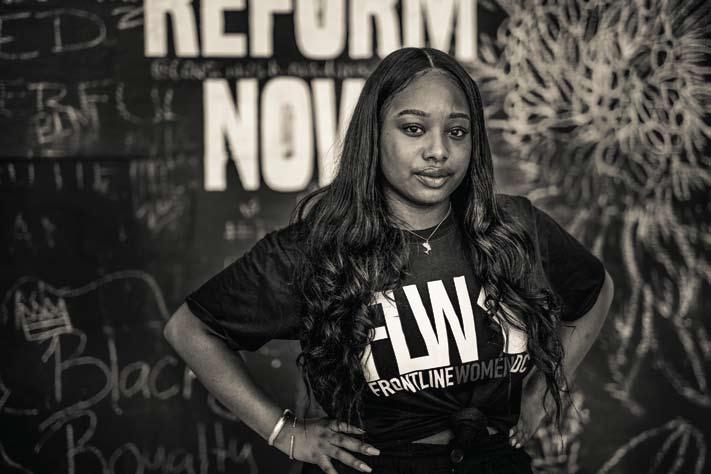
Burwell is originally from Long Island, New York, but has lived in D.C. since enrolling at Howard University as an undergraduate. On Aug. 17, Burwell will virtually return to UDC for her second year of law school and will officially become UDC BLSA’s president for the school year. The organization caught Burwell’s eye during her first year in school as a space where she could build community with other law students of color and support the greater D.C. community through service work, but the scope of activism Burwell has involved the organization in was unprecedented for BLSA, she says. “I wasn’t expecting to do all of this work,” Burwell says, “But that’s the thing with movements.”
On top of completing an internship with the Systemic Justice Project at Harvard University, Burwell has spent her summer with BLSA overseeing their March for Justice, as well as a sit-in and speaker series outside the Supreme Court on July 4 that focused on protecting Black women, and a campaign to collect donations for more than 100 masks and sanitary items, which were then distributed to people experiencing homelessness around the city by the Distant Relatives Project.
Burwell has also dedicated time to disseminating the information she and her peers learn in UDC classrooms, where many students are seeking legal careers related to social justice, to people who might not have access to that kind of education. BLSA does this over social media and at in-person events. As law students, Burwell says, BLSA members can equip their community with information on things such as qualified immunity and the details of their rights to assemble and petition guaranteed by the First Amendment to the U.S. Constitution. “A lot of the information we’re learning, I feel like you shouldn’t have to pay for it.” Burwell says. “It’s just basic rights.”
Although it’s been empowering for Burwell to educate and organize people around the Black Lives Matter movement, she says the work has been exhausting. The work can also be traumatizing, Burwell says, and she often thinks about the possibility that she or a loved one could be the next victim of police brutality. “A lot of the issues are very triggering for me as a Black woman,” Burwell says. “I think a lot of people, especially Black women, we feel like we
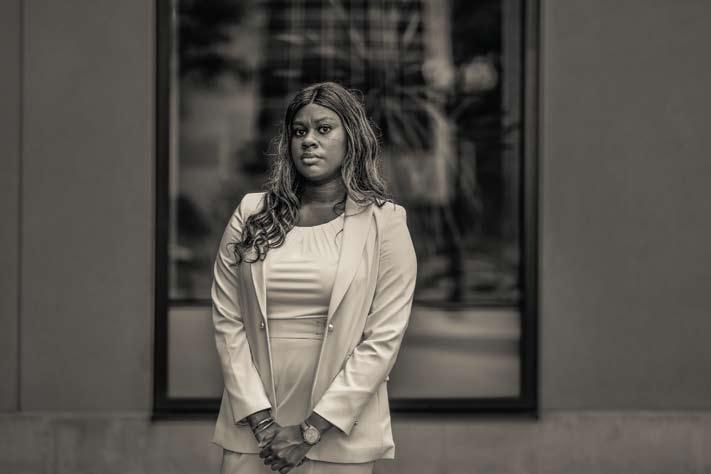
have to uphold this notion of being invincible. Like, we can’t cry.”
Letting herself cry, or be angry, or express whatever she is feeling on any given day, is what Burwell says has gotten her through the work. “We can always have other people there to support us,” she says. “We just have to be willing to accept their help.”
Burwell is also motivated by the knowledge that she’s paving a path toward being able to help her community at a systemic level with her law degree, as a Black woman in a field dominated by White men—especially at the elite level. When Burwell thinks about her future career, she thinks about people like Ben Crump, who leads the legal team for George Floyd’s family, and Lee Merritt, who serves as the lawyer for the family of Ahmaud Arbery. “I want to do work like that,” she says. “I want to be doing something where I’m actually making a difference with my degree.”
JUSTIN DANIELS, 23 DC PROTESTS
DC PROTESTS STARTED with an Instagram account that six strangers made together on the street. It was June 1, and the strangers in question had emerged as the de facto leaders of a crowd of protesters throughout the day, guiding a large group of demonstrators away from the White House and around the city while leading them in chants. They visited the Trump Hotel and Georgetown before ending back at the White House. At the end of the day, people wanted to know who they were.
“Everybody was like, you guys have an Instagram?”
ASHA BURWELL
Justin Daniels, a member of that group, recalls. “We just made the Instagram right in the street, and we were like, follow us. This is us.”
Daniels is originally from Dumfries, Virginia, where he is currently residing, although he lived in D.C. for a few years as a young child and visits the city often to protest. The group leading the protest that day had never met before. They ranged in age from 19 to 30, and in profession from students—like Daniels, who is starting his second year at New England Law School in the fall—to health care workers. They were all interested in continuing to work together,
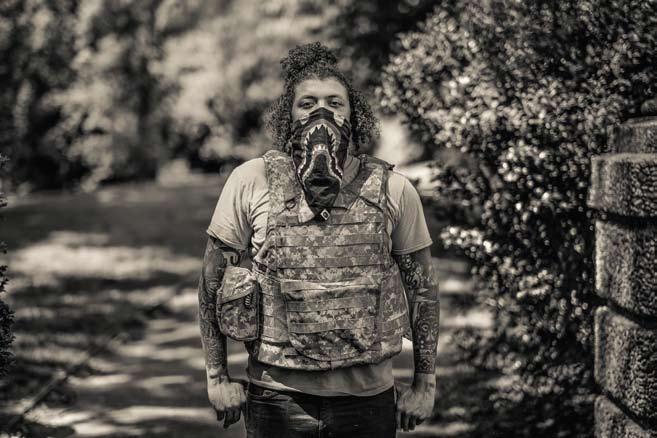
Daniels says, and immediately started planning their next gathering and advertising it on Instagram.
Three days later, the group led their first of many protests calling for an end to police brutality and the defunding of MPD, in which they led a group from Malcolm X Park to Mayor Bowser’s office. Turnout far exceeded their expectations. “We would’ve never thought that we would build this group randomly, and a thousand people would show up the next time we did something,” Daniels says. But they did. People showed up over and over again as the group led more protests along the same route, and supported them by volunteering or donating snacks and sanitary supplies that leaders would hand out to people as they marched.
As DC Protests started to make a name for themselves, they decided to narrow down their mission statement to three core principles. The first is a commitment to defunding local police—last month’s slight budget cut to MPD wasn’t satisfactory, says Daniels. The second is a commitment to community safety, which means maintaining peace at protests. “We try and make sure everyone goes home at the end of the night,” Daniels says.
The third mission of DC Protests is to educate District residents on local politics, and encourage them to get in touch with the councilmembers and other elected representatives who represent them to demand the policy changes they want to see. “It’s really important to know your school board, your city council, your mayor. You need to know who all of these people are,” Daniels says. “You need to know what you’re voting for, and you also need to know what these people have the power to do.”
Before this summer’s wave of action, Daniels wasn’t much of a protester. His political engagement was limited to working on campaigns. But now that he’s started, Daniels doesn’t see himself ever stopping.
The work has also made him reconsider his legal career. “I really am big on criminal defense and criminal reform, and that’s what I wanted to start out with,” Daniels says. “But now I would really like to add immigration law and family law as well. With immigration, I can help out a lot of people. And with family law, I can help out with juveniles in the school-to-prison pipeline.”
Daniels will return to his studies this fall, but his classes will be virtual. He plans to stay in Dumfries and continue organizing. Although he admits that regular protesting will be more of a challenge as many young people go back to
JUSTIN DANIELS
school and begin transitioning to a new normal, he’s hopeful about the future of DC Protests. ”We’ll be here to stay,” he says.
DAMALI LAMBERT, 23 STEPS TO ANOTHER REALITY
ON A HUMID evening in late May, Damali Lambert stood hand in hand with loved ones and strangers, forming a wall of protesters. The group stood a couple blocks away from the White House, and just a few feet away from MPD officers.
“I felt so much fear in my heart, and I felt even my friends’ fear from their hands shaking, their palms getting sweaty,” Lambert says. “I could only imagine how Breonna Taylor felt having a gun to her face, how George Floyd felt having a knee on his neck. I’m feeling this fear and this hurt and this wanting to cry just looking at them in the face, and that’s not how it should be.”
At that moment, Lambert decided she needed to do something to support Black youth in Prince George’s County, where she teaches fourth grade math and science at CMIT South Elementary. On June 3, she founded Steps
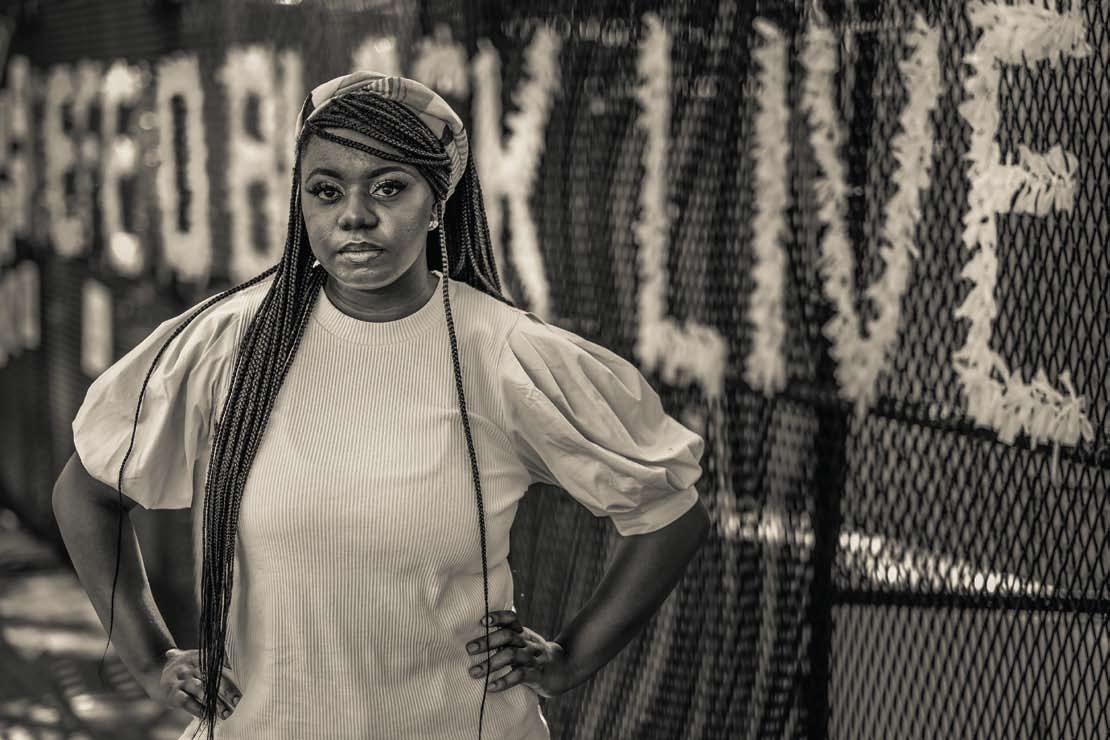
To Another Reality, an organization that provides academic and emotional support to students in the county. “That night, I said we need to start S.T.A.R., because I don’t want any more Black kids to feel unprotected and unsafe in their own communities,” Lambert says.
Lambert is originally from Brooklyn, New York. She moved to D.C. in 2018 to teach at KIPP DC, and started teaching in Prince George’s County in 2019. In the past couple months, Lambert, who is also pursuing a Ph.D. in public policy at George Mason University, has poured her limited hours and funds into getting the organization off the ground. The group organized a Juneteenth festival on Black Lives Matter Plaza that highlighted Black-owned businesses, a sit-in before the Supreme Court to demand justice for women of color who have been murdered, a school supply drive for the fall, and a poetry slam that highlighted young, local Black artists.
At the poetry event, Lambert was moved by a young boy who spoke to recent events.
“He came up, and he was just talking about Fredrick Douglass, and it warmed all of our hearts, because he was feeling it too,” Lambert says. “He ended his poem saying, ‘Get your knees off our necks.’ This is a 6-year-old.”
Lambert says she hopes that S.T.A.R. will provide
DAMALI LAMBERT
community and emotional support for children like the young poet, who are learning at an incredibly early age that their skin color affects the way the world sees and treats them. “It was important for me that minority youth felt like they had a safe haven they could go to, where they can talk about what’s actually going on, where having problems and having pain in your life isn’t something you push under the rug,” Lambert says.
She also hopes S.T.A.R. will provide students in the county with free resources like after-school programs and tutoring, which many of the students in her own classroom can’t otherwise afford. But until S.T.A.R. is approved as a nonprofit and can apply for grants, Lambert will continue funding the organization’s activities out-of-pocket— she’s used $1,500 of her own money to start S.T.A.R.—and through donations—people have donated $2,000 through their website. Lambert will also continue working overtime until she can start paying her staff and hiring more workers. Her team is currently made up of 11 people working pro bono, and they have about 20 regular volunteers.
She isn’t deterred. “I said to [my team], I said, ‘This isn’t going to be easy, but we’re not people that look for easy. We’re people that look for change,’” Lambert says. “Honestly, it feels like this is what I was meant to do.”





